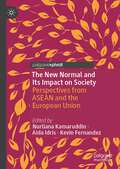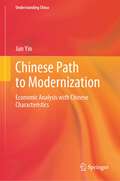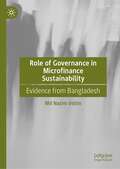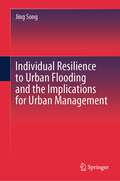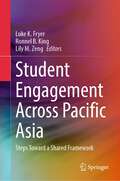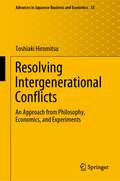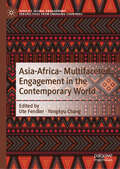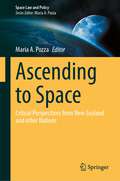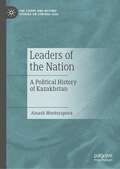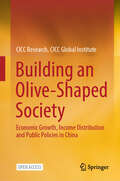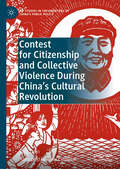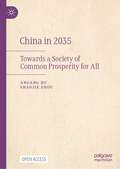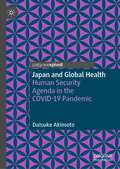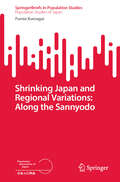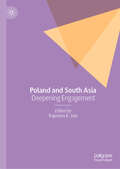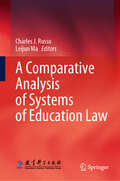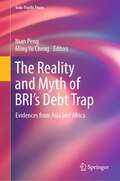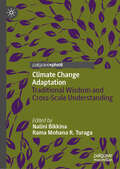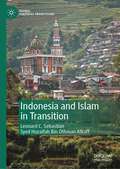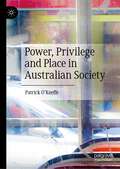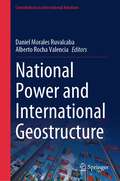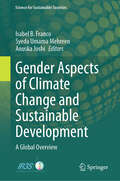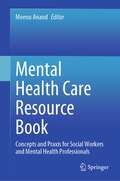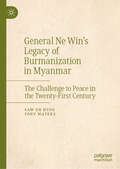- Table View
- List View
The New Normal and Its Impact on Society: Perspectives from ASEAN and the European Union
by Nurliana Kamaruddin Aida Idris Kevin FernandezThis book focuses on the socio-cultural changes and issues experienced in ASEAN and the European Union in the post-pandemic world. In doing so, chapters discuss the social impact of specific themes such as changing work ethics, migration, and cyber security, which have shifted the cultural and economic landscapes of Southeast Asia and Europe. The book will be useful for policymakers, journalists, students, and those interested in discussions of regionalism, and the effects of Covid-19 on social policies ranging from the individual, domestic laws, to national and supranational policies.
Chinese Path to Modernization: Economic Analysis with Chinese Characteristics (Understanding China)
by Jun YinThis book exploratively reviews and refines the theoretical system of economics with Chinese characteristics and the analytical framework of Chinese path to modernization. This book aims to reveal answers to the three questions: what has the theoretical system of economics with Chinese characteristics inherited and developed? What are the experiences and lessons of all countries’ modernization in the world? What is the universality and particularity of Chinese Path to Modernization? As conclusion, the author draws a clue to understand Chinese path to modernization, which is neither “making up for the lessons” nor a “convergence”, but an “innovation” built upon the general principles of modernization. Its universality lies in the overall patterns and trends of modernization, that is, the consistent process of the country's pursuit of national economic growth and people's prosperity. The distinctiveness of this path lies in the concurrent transformation of Chinese economic system and the institutional innovations with Chinese characteristics that unfold throughout this ongoing economic process.
Role of Governance in Microfinance Sustainability: Evidence from Bangladesh
by Md Nazim UddinThis book identifies the effect of governance structure components on outreach and sustainability of microfinance institutions (MFIs) in Bangladesh. It is designed to study and understand these structures with reference to the changing forms and functions of MFI administration, in theory and practice, with experiences from selected countries. It helps readers understand corporate governance across the globe with recent developments in this sector. It provides evidence from Bangladesh on what aspects need to be strengthened and identifies the importance of considering differences in institutional values, culture, and environment while pointing to the risk of applying normative assertions of governance structure. The book suggests that a regulatory and supervisory framework should be introduced in Bangladesh to enhance the governance structure of MFIs. It advocates that the sector requires a robust regulatory environment to improve its governance and administrative frameworks and expand the microfinance sector's outreach and sustainability opportunities. It will benefit researchers and students of economics, corporate governance, accountability, transparency, finance, business administration, microfinance institutions, and applied fields, as well as microfinance practitioners, administrators, and policymakers.
Individual Resilience to Urban Flooding and the Implications for Urban Management
by Jing SongThis book argues that the substantial life and property loss caused by urban flooding might not be a pure result of a vulnerable physical environment-social factors, especially the individual attributes and capacities, could have pivotal roles to play in the resilience discourse as well. In light of this, this research investigates the relationship between individual resilience to urban flooding and urban management, endeavoring to identify place-responsive measures for building resilience for residents vulnerable to urban flooding.
Student Engagement Across Pacific Asia: Steps toward a Shared Framework
by Luke K. Fryer Ronnel B. King Lily M. ZengStudent engagement at the programme and university levels are both critical to students' success in higher education. This book establishes a theoretical and empirical framework for assessing these student experiences together. To this end, the book brings together the two major fields of university quality assurance (US [university engagement] and UK [programme experiences]). This edited book then shows how this integrated approach applies to university experiences across Pacific Asia (Hong Kong, Mainland China, Philippines, Korea, Japan, and Taiwan). It demonstrates how the proposed quality assurance framework can be applied as an intra-institutional tool to enhance student experiences. For readers interested in future of Asia Pacific higher education, this book presents a path towards enhanced cross-national communication between Asia Pacific universities.
Resolving Intergenerational Conflicts: An Approach from Philosophy, Economics, and Experiments (Advances in Japanese Business and Economics #33)
by Toshiaki HiromitsuThis book is an unprecedented consideration of the challenges of what we can do for generations yet to come. Many growing intergenerational conflicts of interest, such as climate change and fiscal sustainability, are the result of the historically new progress of increasing human power, and the resolution of those conflicts demands a new intergenerational ethic. The book offers fresh new ideas for resolving intergenerational conflicts through the exploration of an entirely new field, conceptualized in philosophy, developed in economics, and tested in experiments. In particular, this work develops the theory of intergenerational cooperation based on a new relationship of direct reciprocity between generations. From experimental results, the possibility of intergenerational cooperation through Kantian categorical imperative is shown. The book also examines the effectiveness of inviting representatives of future generations, which are called "imaginary future generations", into the deliberations for current policy decisions. The original Japanese edition of this book was awarded the 66th Nikkei Prize for Excellent Books in Economic Science. The prize was established in 1958 to contribute to the advancement of academics and knowledge in the fields of economics, management, and accounting, as well as to its general dissemination and application.
Asia-Afria- Multifaceted Engagement in the Contemporary World (Africa's Global Engagement: Perspectives from Emerging Countries)
by Yongkyu Chang Ute FendlerThis book provides an insight into the complex entanglements between African countries and India, China, and South Korea from multidisciplinary perspectives connecting approaches from cultural, anthropological, literary, and music studies and art history. The three parts present a regional focus, namely Africa-India, Africa-South Korea, and Africa-China while the single contributions speak to each other and offer complementary insights. At the same time, the chapters also link across the regional realms as they deal with similar topics, such as travelling music genres. In part I, for Pombo material culture is the starting point to investigate the connections between the islands of the Indian Ocean and India by questioning the construction of memory. It highlights various aspects of the multilayered history of connections between Africa, the islands, and India. Part II gathers contributions that are complimentary to each other and therefore contribute to the understanding of the complex entanglements in area studies. Part III (Africa-South Korea) explores the impact of African-American arts and artists on South Korea's popular culture as well as the changing perception of artists of African descent in visual popular culture. It shows the impact of Korean content in South Africa.
Ascending to Space: Critical Perspectives from New Zealand and other Nations (Space Law and Policy)
by Maria A. PozzaThis book explores multidisciplinary perspectives on critical issues in space from the viewpoints of New Zealand and other nations. It brings together the topics examined at the Otago Foreign Policy School 2022 by both domestic and international experts in the area of space, and includes the opening address on space policy delivered by the Minister of Foreign Affairs. This book takes a multidisciplinary approach to New Zealand’s growing space sector in conjunction with other nations’ perspectives on space. It encompasses space science, military and defence matters, space tourism and astronaut rescue, and international legal and policy frameworks, while taking into account future considerations. Readers such as academics, students, policy advisers, diplomats, government officials and others engaged in the field of space will find value in this book. It will appeal to think tanks and international institutions grappling with the complexities that are presented by the outer space domain.
Leaders of the Nation: A Political History of Kazakhstan (The Steppe and Beyond: Studies on Central Asia)
by Ainash MustoyapovaThe book tells about people who lived in an era of historical cataclysms, wars and revolutions, changes in political formations. The generation of the Kazakh intelligentsia responded to the historical challenge facing the Kazakhs at a turning point in history. These are people born at the end of the 19th century, educated in different countries and united by the idea of overcoming colonial dependence on the Russian Empire.The author aims to form a holistic view of a galaxy of outstanding personalities who, in an important historical period, were able to take responsibility for the people and their future. The history of the country is perceived through the prism of their destinies, views, activities and death.The material of the book is a biographical sketch and covers the history of Kazakhstan in the first third of the twentieth century, until the period of the Great Terror (1937–1938).
Communicating Political Humor in the Media: How Culture Influences Satire and Irony (The Language of Politics)
by Ofer FeldmanThis anthology of studies is a follow-up to Political Humor Worldwide: The Cultural Context of Political Comedy, Satire, and Parody. It further examines political humor as a distinct sub-discipline of political communication, influenced and shaped by a country’s culture. The book’s contributors, experts drawn from the academic fields of political science, communication, linguistics, sociology, culture studies, political psychology, and others, offer an assortment of studies from multiple disciplinary perspectives. Focusing on political humor in the media, the authors offer a panorama of political humor—including political satire, parody, and cartooning—in Spain, Poland, Montenegro, Turkey, Japan, Australia, Iran, Brazil, Argentina, Malaysia, and Indonesia, among others. They detail political humor’s multifaceted and versatile nature, suggesting that national culture and political humor expressed in the news media are intertwined; thus, understanding political humor requires looking at the cultural landscape of a given country or society. The book helps readers to better understand the factors that shape political humor across the globe in a variety of political and media systems.
Building an Olive-Shaped Society: Economic Growth, Income Distribution and Public Policies in China
by CICC Research, CICC Global InstituteThis open access book offers a comprehensive analysis of China’s way of economic development balancing between efficiency and equity, striving to investigate existing challenges and to discuss the role of fiscal policies and philanthropy to mitigate social inequality. The book analyzes the current overall state and challenges of China's income and wealth distribution and describes the social inequality in specific fields such as labor market, housing markets, education, public health, infrastructure building and carbon emission. This book also explores the implications of long-run trends of macro-asset pricing. The book is both academically rigorous and readable. This valuable reference will attract readers in economics, public finance and social policy who seek to better understand China’s path of combating social inequality.
Contest for Citizenship and Collective Violence During China’s Cultural Revolution (IPP Studies in the Frontiers of China’s Public Policy)
by Yang LijunThis book has been groundbreaking for scholars of the Cultural Revolution, but hitherto was only available in Japanese and Chinese. This edition allows English-language readers to access the work for the first time. The author explains how political struggles within the state, competing sectarian interests, and other complex factors intertwined to produce various forms of collective violence that had a major impact on the political, economic, and social order of the time.
China in 2035: Towards a Society of Common Prosperity for All
by Angang Hu Shaojie ZhouThis open access book is a new study by the Institute for Contemporary China Studies at Tsinghua University, condensing the new achievements of the Institute’s national policy research. Taking "common prosperity" as the theme, the book elaborates the historical background, ideological sources and theoretical connotation of common prosperity. It reviews the theoretical and practical innovations of common prosperity in three historical periods: the socialist revolution and construction period, the new period of reform and opening up and socialist modernization, and the new era of socialism with Chinese characteristics. It discusses the development goals and practical approaches for China to build a society of common prosperity by 2035, analyzes the development basis and challenges China faces in promoting common prosperity, and puts forward the overall goals and quantitative indicator system for achieving common prosperity in the new era, as well as major tasks, policy logic and pathway for promoting common prosperity. The book also looks into the great significance and world significance of China's realization of common prosperity. Policy interpretation in the book is thorough, and the data is accurate, with authoritative, professional and forward-looking perspectives. This is an open access book.
Japan and Global Health: Human Security Agenda in the COVID-19 Pandemic
by Daisuke AkimotoThis book examines the development of Japan’s human security diplomacy for global health in the pre- and post-COVID-19 world. In the light of global health politics and human security studies, it attempts to clarify Japan’s financial and diplomatic contributions to the Gavi, the Vaccine Alliance (Gavi), the COVID-19 Vaccines Global Access (COVAX) Facility, the Global Fund to Fight AIDS, Tuberculosis and Malaria (Global Fund), the Global Polio Eradication Initiative (GPEI), the Tokyo International Conference on African Development (TICAD), official development assistance (ODA) related to global health, the Global Health Innovative Technology Fund (GHIT Fund) to combat neglected tropical diseases (NTDs), the Coalition for Epidemic Preparedness Innovations (CEPI) in preparation for future pandemics, and the International Monetary Fund (IMF) to enhance the global health system. Moreover, the Japanese Business Leaders’ Coalition for Global Health in collaboration with the Bill & Melida Gates Foundation in the field of innovative technology, such as an application of artificial intelligence (AI) for global health will be scrutinized. In addition, this research investigates implications of Japan’s Global Health Strategy for Japan’s global health diplomacy at the event of the G7/G8 summits, especially the 2023 G7 Hiroshima Summit. Finally, this book identifies multiple global health actors that constitute the emerging and changing global health architecture in the post-COVID-19 world.
Shrinking Japan and Regional Variations: Along the Sannyodo (SpringerBriefs in Population Studies)
by Fumie KumagaiTaking the Goki-Shichido (Five Home Provinces and Seven Circuits of Ancient Japan) as a theoretical framework, this book examines shrinking Japan from a regional variation perspective by municipality along the ancient Sannyodo, which comprises eight provinces and four prefectures today. The book identifies the principal explanatory factors based on the small area data of e-Stat through GPS statistical software tools such as G-census and EvaCva, within a historical perspective. This historical knowledge helps in understanding the significance of the regional cultural heritage that remains in each municipality today. The book pays special attention to municipal variations within the same prefecture, presenting a completely unique approach from what other researchers have pursued.This book studies two present-day prefectures along the ancient Sannyodo for detailed analyses of the impacts of regional variations of population decline in Japan. They are Hiroshima Prefecture, made up of the former Bingo and Aki provinces, and Yamaguchi Prefecture, formed by the ancient provinces of Suo and Nagato. The reasons for selecting these two prefectures of ancient Sannyodo are twofold. First, they are made up of a multiple number of the ancient provinces. Second, other prefectures that fall under the Sannyodo have been studied in the previous works of the present author by adopting the same methods of analyses. Thus, by presenting unique analyses of regional variations on small municipal levels in Hiroshima and Yamaguchi prefectures along the Sannyodo, this book offers suggestions for effective regional policy to revitalize shrinking Japan to a sustainable one.
Poland and South Asia: Deepening Engagement
by Rajendra K. JainThis book explores the political, economic, defence, and cultural relations of Poland with South Asia—Afghanistan, Bangladesh, Bhutan, India, Myanmar, Nepal, Pakistan, and Sri Lanka—since the late 1940s to the present. It examines how Polish preoccupation with gaining admission to NATO and the European Union led South Asia to fade into the margins of Polish foreign policy. It discusses key narratives and perceptions of South Asia in the Polish media and thinktanks, features of the South Asian diaspora in Poland, and assesses future prospects of Warsaw’s deepening political and economic engagement with the region. The pioneering book will be essential reading for students and scholars of Central/East European studies, International Relations, Indian foreign policy, Polish-Asian politics and foreign policy.
A Comparative Analysis of Systems of Education Law
by Charles J. Russo Leijun MaThis book focuses on enhanced educator awareness of issues involving the status of the right to education as guaranteed by various legal systems throughout the world, in light of the growing interest in comparative and international studies, including the law. Consequently, this interdisciplinary, comparative book, which includes original chapters by leading academicians with expertise in law and education, is designed to serve as a resource for researchers in education and law as well as policymakers and students. To this end, the book provides readers with an enhanced awareness of the nature of legal systems impacting education throughout the world. Education is the driving force of the world development as well as the basic way to realize human rights and values. At the same time, law plays an important role in the protection, evaluation, guidance, and promotion in the process of the development of education. The book thus has interdisciplinary appeal. Various audiences will find this highly accessible book informative and valuable, including scholars with an interest in Education Law, university faculty and classes (whether involved in teacher preparation or educational leadership), legal practitioners, and university libraries.
The Reality and Myth of BRI’s Debt Trap: Evidences from Asia and Africa (Indo-Pacific Focus)
by Nian Peng Ming Yu ChengThis edited book aims to present a well-balanced view on the heated debate about BRI’s “debt trap” controversy within the route states by presenting compelling evidence from Asian and African countries. It is contributed by the university scholars, think tank experts, and governmental officials from the concerned parties such as China, USA, South/Southeast Asia, and Africa to discuss this new topic from their perspectives. It not only examines the origins and changes in external debt among the BRI route states before and after the launch of the BRI, but also analyzes the outcomes stemming from BRI projects. The book covers 12 chapters, in which the first chapter briefly introduces the aims and scope of this book. The following 2 chapters look at Chinese and Indian perspectives on the “debt trap”, respectively. The next 9 chapters examine the debt issue and BRI projects in Southeast Asian, South Asian, and African states, which mainly involve Myanmar, Cambodia, Laos, the Philippines, Malaysia, Indonesia, Bangladesh, Nepal, and Nigeria, and give some useful policy suggestions to reduce the debt burden and promote the socioeconomic development in these countries.
Climate Change Adaptation: Traditional Wisdom and Cross-Scale Understanding
by Nalini Bikkina Rama Mohana R. TuragaThis book discusses how climate change needs to be anchored in indigenous knowledge with reference to resource management, infrastructure, livelihoods, and social institutions, with a unique focus on risks and provenances of resilience available to the local communities. Beyond the scientific know-how on climate change, this volume highlights traditional wisdom, which through its hands-on learning plays a crucial role in amalgamation with cross-scale understanding. It documents the deliberations of a seminar that brought together traditional wisdom and cross-scale understanding of academicians, researchers, practitioners, and grassroots functionaries directly or indirectly working with communities in the area of climate change adaptation and thereby brings together adaptation and allied practices from across a spectrum of specialties and practitioner contexts. It discusses several insights and novel practices and is purported to provide significant research and policy implications in the spirit of thinking globally but acting locally.
Indonesia and Islam in Transition (Global Political Transitions)
by Leonard C. Sebastian Syed Huzaifah Othman AlkaffThis book focuses on Islam in Indonesia, showcasing the wide range of Muslim organisations, belief systems and movements, together with an analysis of the political behaviour of Indonesian Muslims. It includes an investigation of the structure of groups, organizations, and societies, and how Muslims within the archipelago interact within these contexts. In doing so, it promotes a more nuanced understanding of Indonesian Muslim society by approaching it through the utilisation of scholarly frameworks. Theories related to religion and society are used, especially in characterising the transition of the Indonesian Muslim society from pre-New Order to post-New Order. Particularly significant is Abdullah Saeed's framework in understanding one’s attitude towards key and contemporary issues, originally used to understand one’s attitude towards the religious ‘other’. The authors thus adopt this framework in the book, as a method of categorising people in a diverse society which in turnhelps readers to understand the nuances of Islam and Muslims in a huge country like Indonesia.
Power, Privilege and Place in Australian Society
by Patrick O'KeeffeThis book critically analyses important social issues experienced in Australia, such as economic inequality, precarious work, unequal access to quality education and health care, housing insecurity, colonisation, racism and discrimination, activism and social change. In doing so, it contributes to urgent discussions in key areas of Australian society. At a moment in time where a more progressive, caring, inclusive and optimistic public discourse is required, this book takes up the challenge of thinking constructively and creatively about the possibilities for change. While the book focuses on Australian-specific experiences, connections to international examples are made to ensure this work has relevance to people beyond an Australian context.
National Power and International Geostructure (Contributions to International Relations)
by Daniel Morales Ruvalcaba Alberto Rocha ValenciaThis book addresses three innovative aspects for the study of International Relations: first, proposes a novel theoretical-methodological framework for the study of national power, and based on this, a quantitative analysis technique is formulated that allows us to study the evolution of state power over almost five decades. Second, states play a fundamental role in the international system, which is why the study of their roles in the world cannot be limited to old, insufficient, and contradictory categorizations. Having new categories of states becomes an even more urgent task in the rapidly changing international order than it is today. This book proposes nine categories of powers and states that cover all the countries that currently exist. Third, the international geostructure of world power is proposed, which represents a new theoretical notion that helps to explain how the international insertion of states and their possibilities of action are conditioned by the unequal distribution of national power and by their structural positioning in the international system. This book is for all students of International Relations, academics, and people who want to understand national power as a fundamental factor in relations between countries.
Gender Aspects of Climate Change and Sustainable Development: A Global Overview (Science for Sustainable Societies)
by Isabel B. Franco Syeda Umama Mehreen Anuska JoshiThis book addresses how sustainability discourse and advocacy can translate to impactful policies especially when bridging the divide between sustainability, climate change and gender. The book explores various areas, such as conservation, climate action, sustainable fashion, and corporate sustainability, and defines the existing sustainability gaps in the selected cases (country/sector/region). It highlights the value of sustainability science and climate change on innovative approaches to research, education, capacity-building, and practice to transform rhetoric into impact sustainability while encompassing cases from various industries, sectors, and geographical contexts. While emphasizing SDG 5, the book chapters also show the transboundary implications of gender equality and inclusivity to other sustainable development and climate change goals and targets. The contributions are exemplary in highlighting the relation of gender inclusivity in strengthening efforts to protect andsafeguard the world’s cultural and natural heritage and making cities and human settlements inclusive and safe (Goal 11), protecting, restoring, and promoting sustainable management of terrestrial ecosystems and reverse land degradation (Goal 15), ensuring access to affordable, reliable, sustainable and modern energy for all (Goal 7), promoting sustainable and inclusive economic growth with productive and decent employment for all (Goal 8), promoting inclusive and sustainable industrialization (Goal 9), adopt policies to reduce inequalities (Goal 10), ensure sustainable consumption and production pattern (Goal 12), addressing climate change impacts and building resilience (Goal 13), and ensuring availability and sustainable management of water and sanitation for all (Goal 6).
Mental Health Care Resource Book: Concepts and Praxis for Social Workers and Mental Health Professionals
by Meenu AnandThis book takes a strengths-based approach to focus on different aspects of mental health. It summarizes the complex intertwining of illness and culture in the context of rising cases of mental disorders in the post-pandemic world. The book contains three sections, each incorporating essential skills and praxis. The book's first section examines the fundamental and conceptual underpinnings of mental health, well-being, and wellness from an eclectic lens to present an overview of mental health from the biopsychosocial perspective. The second section demonstrates using and transforming theoretical principles and perspectives into practice-based skills through detailed narrations and illustrations. It also showcases how to apply these skills in real-world settings. The third and final section combines field-based narratives that reflect multifaceted challenges and efforts toward treating mental disorders and promoting positive mental health, including success stories in diverse settings.This section highlights the importance of praxis in mental health. The book is a valuable resource for scholars and professionals in various fields, such as social work, psychology, sociology, social psychiatry, gender studies, and anyone interested in learning more about mental health and well-being.
General Ne Win’s Legacy of Burmanization in Myanmar: The Challenge to Peace in the Twenty-First Century
by Saw Eh Htoo Tony WatersThis book focuses on how Burmanization created and reinforced ethnic divides since the 1962 coup d’etat. when General Ne Win concentrated all authority in the Burmese speaking army. Background research for the book includes Burmese language materials from the Burmese Socialist Party (BSP) and others that describe with what the BSP believed in their own terms. This is unique from previous works on the topic which either simply pointed out that the policies “didn’t work” and therefore are uninteresting, or to claim that they were “necessary” given the chaos of the previous regime. The authors agree that Ne Win’s policies “didn’t work.” However, the book goes further by elaborating why Burmanization policies developed in the 1960s are important for understanding Burmese society today. Most importantly, Ne Win’s ideology reflects how patterns of interethnic relationships in Myanmar lead to the “intractability” of the battles in early twenty-first century Myanmar.
